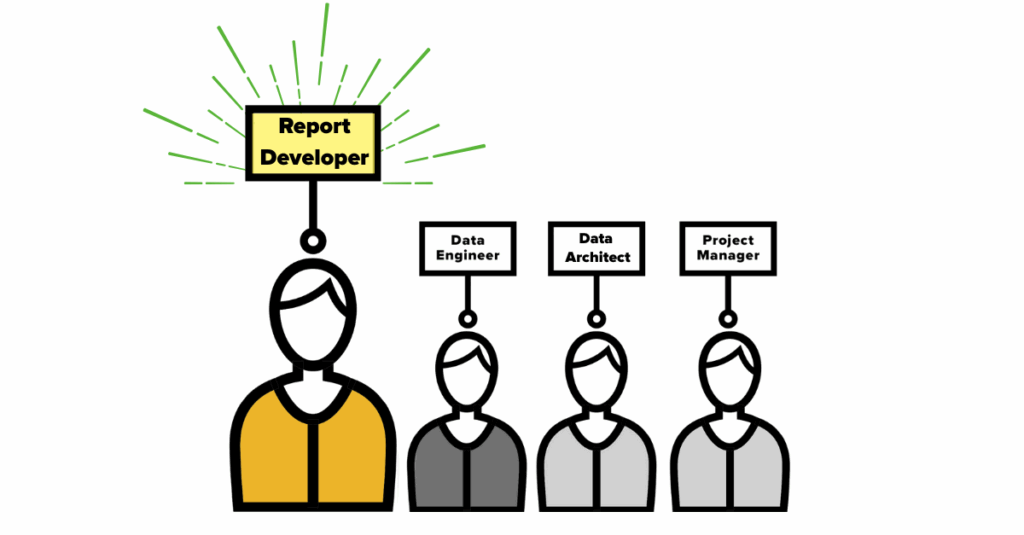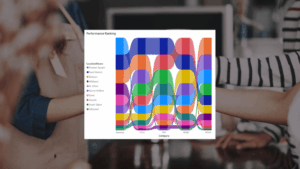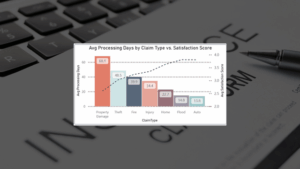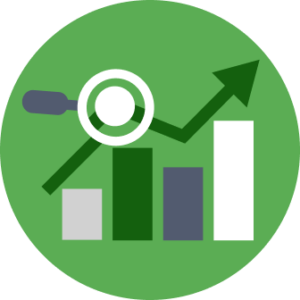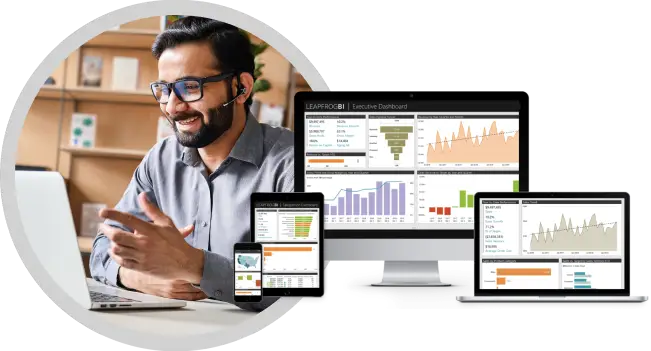Businesses are under increasing pressure to act fast and use real-time data to level-up decision-making and stay competitive. But collecting data is only half of the battle. Organizing it and delivering in a way that’s accurate, clear, and actionable is a challenge that trips up many well-intentioned teams.
According to Collibra’s report on The State of Data Confidence, 37% of surveyed professionals say “data silos prevent efficient data sharing across teams,” while 32% call limited data visibility or discoverability a top concern.
Report developers help businesses overcome these obstacles by making data usable. They use business intelligence (BI) tools to transform scattered, complex data into clear, actionable dashboards that inform both daily operations and long-term strategy. In this way, report developers play a key role in shaping how organizations monitor performance, evaluate outcomes, and respond to change.
But finding the right report developer to support that work isn’t always easy.
What do report developers do? What should you look for when hiring a report developer? And how can you avoid a costly mis-hire?
In this guide, we explain what report developers do, what skills and traits to look for, why hiring a report developer is often harder than expected—and other options for building a reliable, impactful reporting process.
What Does a Report Developer Do?
A report developer builds and maintains dashboards and reports that help stakeholders make informed decisions. Specifically, they design data visualizations that surface the right metrics in the right format at the right time.
This kind of work means report developers must thrive at the intersection of data, tools, and people, where they can translate business goals into data requirements—and then into intuitive reports that can guide decisions and drive action.
While they may use different tools to build dashboards (e.g., Power BI, Tableau, Looker, etc.), the core responsibilities of a report developer remain consistent, no matter the industry:
- Gather requirements from stakeholders
- Connect to and shape data sources
- Build reports and dashboards
- Test, validate, and maintain reports
Here’s a closer look at a report developer’s main responsibilities:
1. Gather Requirements from Stakeholders
Creating a high-quality report that actually drives practical decision-making starts well before data visualization. It starts with conversations.
As a first step in the reporting process, report developers must meet with different stakeholders in your organization to understand their goals, priorities, and questions.
This step is critical—because while many people in your organization may use these dashboards, they’ll likely have different needs and goals. For example, your executive team may want high-level KPIs and trends, while your marketing team may need campaign-level metrics and lead-conversion data.
It’s up to the report developer to ask the right questions to understand stakeholders’ specific use cases, which metrics matter most, and how different users will interact with the dashboards.
Curious how data analytics can support marketing programs? Read Using Business Intelligence for Marketing Analysis to Power Data-Driven Campaigns.
2. Connect to and Shape Data Sources
Of course, building reports requires access to clean, reliable data. That means report developers need to know how to identify the right data sources and prepare that data for analysis. They often work closely with data engineers and/or database administrators to understand data availability, extract relevant fields, structure the data for reporting, and resolve any inconsistencies along the way.
Don’t forget: Report developers are different than data engineers or analysts. While data engineers build and maintain the pipelines that move and structure data, report developers consume that data to create business-facing dashboards and reports that surface meaningful insights.
What role does a data engineer play in helping your business build and maintain a trusted data foundation? Read the guide on What to Know Before Hiring a Data Engineer.
3. Build Reports and Dashboards
Once stakeholder goals are defined and data is properly prepared, report developers take the lead to design and build dashboards that surface the right insights at the right time.
This is where technical expertise meets design intuition.
Good report developers know that clarity is king. They strategically choose visuals that easily communicate trends and outliers, and they structure dashboards in a way that aligns with how stakeholders naturally scan and interpret information.
At the end of the day, no matter the tools, the goal is to tell a clear story that prioritizes what matters and eliminates unnecessary noise so even non-technical users can confidently engage and make informed decisions quickly.
4. Tests, Validates, and Maintains Reports
No matter how slick or visually polished, reports are ultimately meaningless if they can’t help your organization make more informed, strategic decisions. And that requires high-fidelity, high-quality data.
But many organizations are struggling. Per Ataccama’s 2025 Data Trust Report, 68% of CDOs call data quality their top challenge, with 40% admitting they struggle to maintain consistent data quality.
To keep reports accurate and useful over time, report developers can’t just hit publish and then walk away after deployment. Instead, they must continuously test, validate, and maintain reports and dashboards to ensure ongoing accuracy and reflect changes in data structure, business goals, and stakeholder needs.
What Are the Characteristics of a Good Report Developer?
It’s a given that report developers must know how to use BI tools and build visualizations. But in order to create high-quality, high-impact dashboards and reports, they also need strong communication skills, business context awareness, and an intuitive sense of how people interact with data.
When getting ready to hire a report developer, look for these four qualities that set great candidates apart:
1. Strong Communication Skills
Report developers sit between business users and data teams, helping translate business questions and analytical requirements into visual outputs that drive strategic decisions. To do this effectively, they need to know how to ask clarifying questions, interpret vague requests, and manage competing priorities from different stakeholders.
Strong communication skills are essential to ensure nothing gets lost in translation and that the final reports actually answer the questions they’re intended to.
Communication is critical post-delivery, too. A report developer must be able to clearly explain what a report includes, how the data is structured, and how users can navigate and interpret the visuals.
2. Proficiency with BI Tools and Data Modeling
Of course, creating BI reports and dashboards requires fluency in BI tools, like Power BI, Tableau, Looker, or Qlik. In fact, Indeed’s 2024 Insights Report names Power BI as the seventh most in-demand enterprise IT skill with job postings for the data visualization tool appearing in over 44,000 job listings.
But basic tool knowledge isn’t everything. In addition to knowing how to build visualizations, report developers must have a solid grasp of underlying data structures and modeling concepts, such as data relationships, filtering logic, calculated fields, and performance optimization.
Without this foundation, even the most visually polished dashboards can be inaccurate, clunky, or misaligned with how users actually need to analyze and act on the data.
3. Business Context Awareness
To build truly useful reports and dashboards, report developers need to know more than tool features or technical specs. They need a working understanding of the broader business context, e.g., what is your business ultimately trying to accomplish? Which KPIs matter most? Who will act on the data?
Without strong contextual awareness, report developers can’t prioritize what matters or design reports that support real-world decisions. For example, if a report developer doesn’t understand how your sales pipeline works, they may struggle to build a conversion dashboard that accurately reflects performance at each stage.
For many more technically-focused candidates, this kind of user-first thinking isn’t always a given—but it’s critical. For the second year in a row, LinkedIn ranked communication as employers’ most in-demand skill, signaling the prevailing importance of soft skills in our increasingly digital world.
3 Main Challenges in Hiring a Report Developer
Hiring a report developer might seem like a straightforward process if you know which BI tool you want to use and you have clear reporting goals. But in practice, finding a report developer who can master both the technical details and the business know-how proves more challenging than most organizations realize.
If you’re considering hiring a report developer, keep these three common challenges in mind:
1. Limited Talent Supply, High Market Demand
Demand for BI and analytics expertise has exploded in recent years—and that growth isn’t expected to slow down any time soon. In fact, the U.S. Bureau of Labor Statistics predicts roles like data scientist will grow by 36% between 2023 and 2033. That’s a startling number when you consider the average growth rate across all jobs is just 4%.
With more companies investing in analytics and preparing to become a “data-driven organization,” experienced report developers are in increasingly high demand. And, unfortunately, supply hasn’t kept up.
This talent gap puts small- and mid-sized businesses at a disadvantage, as they’re often unable to offer the same salary, benefits, and career growth opportunities when competing with larger organizations for top talent.
What does a data team look like at a small company? We’ve done the research. Read The State of a Data Team at Small- and Mid-sized Companies.
2. Overlapping Job Titles Create Confusion
“Report developer” is a common term to describe BI professionals who build dashboards and data visualizations—but there is room for confusion.
Some report developers call themselves BI analysts. Others might respond to job listings for dashboard reporting specialists or data analysts. Still other organizations may call them Power BI developers or data visualization engineers.
While the overlap in job titles does give a degree of flexibility, it also adds confusion and complexity to the hiring process, making it even more difficult to pin down already hard-to-hire report developers. Whether HR teams overlook qualified candidates or screen out potential fits too early, you may end up missing out on great talent—simply because your sought-after title didn’t match their resume.
3. Difficulty Assessing Data Literacy and Design Thinking
Knowing how to use a BI tool isn’t always the same as knowing how to build a useful report.
That said, it’s common for hiring teams to focus solely on tool proficiency and overlook a candidate’s ability to interpret business logic, structure data, and present insights in a way that guides users towards actionable insights.
Evaluating these “softer” skills (e.g., UX awareness and stakeholder empathy) is notoriously difficult in interviews—despite their outsized impact on adoption and effectiveness. Unfortunately, when organizations lack strong internal data teams to vet candidates, hiring managers often default to what’s easiest to screen: certifications and visuals.
But technical information alone is rarely enough to determine whether a developer can communicate effectively, build trust with users, or collaborate meaningfully to improve the data culture of your organization.
Think off-the-shelf dashboards are helpful? Think again—then explore why off-the-shelf dashboards are never enough.
3 Top Interview Questions to Ask When Hiring a Report Developer
Resumes can tell you which BI tools a candidate has used, and portfolios can give you a high-level look at their visual style. But to really determine whether a potential report developer has the skills and mindset to support your organization, the best insights come from thoughtful interview questions.
Use these three interview questions to dig beneath the surface and uncover candidates who think critically, communicate clearly, and design strategically for real-world problems.
1. Tell me about a time you turned a vague report request into a useful dashboard.
This question helps you assess two critical skills in one fell swoop: communication and business translation.
By listening to how the candidate approached the situation, you can evaluate whether or not they can handle ambiguity, know how to ask the right follow-up questions, and have the judgment (and confidence) to turn a loosely-defined idea into something actionable.
Specifically, pay attention to how the candidate describes the original request, what they did to clarify stakeholder needs, and how they structured the end result.
2. What’s your approach to building a report for non-technical users?
Dashboards are built by data professionals, but they’re used by a wide range of business users—and not everyone necessarily knows how to interpret a trend line or filter a report for their specific needs.
This question highlights whether the candidate takes time to consider the user experience when designing reports.
Look for signs that they understand different user roles, take steps to simplify complex data, and apply good design principles, like clear labeling and a visual hierarchy. Strong report developers retain empathy for the end user and know how to structure content to make critical data easier to consume.
3. How do you validate the data behind your reports?
Trust in reporting starts with data accuracy. This question reveals how much care a candidate puts into checking their work before it goes live—and how they respond to feedback or concerns when something doesn’t look quite right.
Ask for examples of how they’ve validated measures, confirmed assumptions, or worked with data engineers or SMEs to resolve discrepancies in source systems. Look for a candidate who approaches validation via both technical methods (e.g., test filters) and collaborative ones (e.g., peer review or stakeholder walkthroughs) to ensure accuracy, clarity, and long-term trust in reporting.
3 Red Flags When Hiring a Report Developer
The resume is an important indicator of knowledge and experience—but it doesn’t tell all. Even candidates with the right tools on their resume and a polished portfolio might not be the best fit for your organization.
To avoid unwanted surprises and reduce risk, keep an eye out for subtle warning signs during interviews—these three are especially important:
1. Limited Tool Flexibility
If a candidate seems deeply tied to one specific BI platform or shows reluctance (or even resistance) to working with others, that could become a serious limitation down the road. Even if your organization currently uses that same tool, it’s smarter to look for adaptability—not dependency.
Plus, a narrow toolset could be a sign of outdated experience or even limited curiosity. While specialization is common and even valuable, you want someone who’s excited about learning new tools and who can evolve and grow with your tech stack over time.
Learning new tools is an important part of ongoing tech fluency. Read our tried-and-proven tips on How to Pass the Microsoft Fabric Certification DP-700 Exam.
Read more about Microsoft Fabric Here.
2. Overreliance on Templates
A dashboard built entirely with out-of-the-box visuals or default templates is never going to be as effective as a thoughtfully designed, custom report. But it’s hard to judge a candidate’s design thinking in the middle of an interview. Instead, pay attention to how they talk about layout decisions, user roles, and customization.
If a candidate seems to skip over these steps or emphasize speed over quality, that could be a sign that they’re overly reliant on boilerplate visuals or prebuilt components. While templates aren’t always a bad thing, you don’t want dashboards that feel generic—or fail to meet the real needs of your team.
3. Poor Validation Practices
When asked how they ensure data accuracy, some candidates might struggle to deliver a clear answer. While this could just be a case of typical interview jitters, it might also indicate an inattention to data quality.
No matter what industry you’re in, data accuracy is non-negotiable. Without a report developer who prioritizes validation and ongoing maintenance, you risk building a reporting system that’s misleading at best and harmful at worst.
How Much Is a Report Developer Paid?
Like any position, a report developer’s salary will vary based on their education and experience, as well as the industry and even location. For example, hiring a report developer in a competitive city like New York or Chicago will likely cost more than hiring a fully-remote role or one in a lower-cost region.
That said, it always helps to look to the national average. According to ZipRecruiter, the national average for a data scientist is $123,000. Of course, this doesn’t include benefits, bonuses, and other overhead costs of supporting an in-house data employee.
Why Is It Hard to Find a Good Report Developer?
As more organizations prioritize data-driven decision-making and real-time reporting, the demand for report developers and other BI professionals is steadily climbing. In fact, the demand is so high that there isn’t enough qualified talent to go around.
According to Forrester’s Data Culture and Literacy Survey 2023, “organizations need 1.3X more data literate people to achieve their strategic objectives.”
Report developers’ unique blend of technical skills, business acumen, and design intuition makes them critical players in an organization’s ability to turn data into meaningful, actionable insights. It also makes them hard to find.
This is especially true for small- to mid-sized businesses that typically don’t have the budget or brand recognition to compete with large-scale enterprises for increasingly in-demand, top-tier BI talent.
What Happens If You Hire the Wrong Report Developer?
When you’re under pressure to produce dashboards and quickly transition to “data-driven decision-making,” it’s common to rush the hiring process—especially if you don’t already have an in-house data team to vet prospective report developers.
You hold a few interviews, listen to several candidates rattle off their tool experience, and, ultimately, pick one and hope for the best. But if you don’t have luck on your side, you can get stuck with someone who looks good on paper but struggles in practice—and consequences that go far beyond one bad report.
Here’s what can happen if you hire the wrong report developer:
- Misleading insights: If a developer routinely misapplies business logic or fails to validate metrics, you can end up with dodgy dashboards that inflate numbers, understate risk, or otherwise point teams in the wrong direction. Even worse, you may not catch the error until your team has already used the dashboard to make decisions and take the wrong course of action.
- Hard-to-read reports: When reports are poorly structured, cluttered with unnecessary visuals, or missing key context, stakeholders can’t—or won’t—use them. Not only is this a waste of time and resources, but it also means you’re missing out on key opportunities to drive alignment, action, and accountability through data.
- Lost data trust: Sometimes, all it takes is one incorrect number in a meeting for team members to question the validity of all your dashboards—and potentially swear off using them altogether. If a report developer’s shoddy work causes your teams to lose faith in the data, then even your most powerful insights won’t make an impact.
Consider Hiring a Fractional Data Team Instead of a Report Developer
Report developers are essential for transforming disorganized data into dashboards, reports, and other visualizations your entire business can use to make smarter, faster decisions. But a good report developer does more than drag and drop charts into templates. They connect the dots between business context, data logic, and design and know how to turn information into insight.
These skills make them both very valuable for your business—and very hard to hire, especially if you’re a startup or a small- to mid-sized business dealing with small budgets.
A fractional data team gives you another way.
With a fractional data team, you get access to the reporting skills you need—when you need them—without the long-term commitment or responsibilities of hiring and managing in-house employees.
Better yet, you get more than one report developer’s know-how. You get a full team with complementary skills (e.g., report developers, data analysts, data engineers, etc.) who work together to help you scope requirements, source the right data, and build custom reports and dashboards that reflect your business’s real pain points and priorities—and help you take meaningful action.
Whether you need to launch one report or build a scalable reporting infrastructure for the long haul, a fractional data team offers the flexibility and expertise to move quickly and confidently—without hiring a full analytics department.
Not sure if it’s the right move for your business? Learn more about what you get when you choose a fractional data team.
